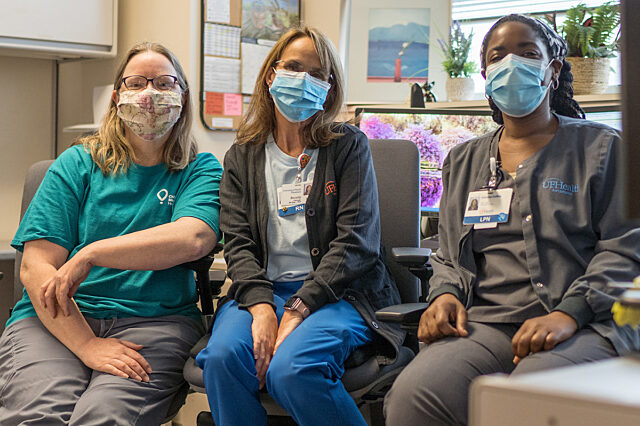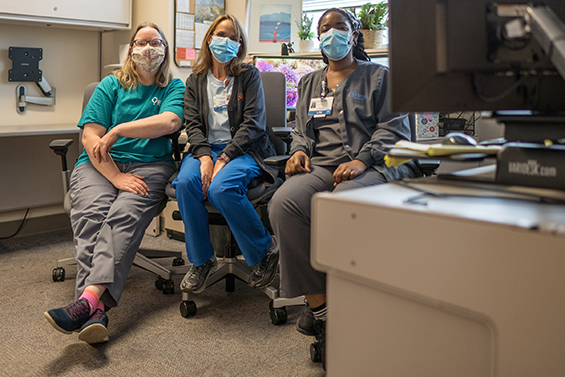Get the answers to cancer-related COVID-19 questions


Stay-at-home restrictions are beginning to lift in several areas across the United States, but immunosuppressed cancer patients are still at high risk of falling seriously ill from the novel coronavirus COVID-19.
In a recent University of Florida Health Cancer Center webinar, “COVID-19: What People with Cancer Need to Know,” Merry-Jennifer Markham, M.D., FACP, FASCO, associate director for medical affairs for the UF Health Cancer Center, discussed how to navigate cancer during the COVID-19 pandemic.
Here, Dr. Markham answers some cancer-related COVID-19 questions:
Is it safe to delay my cancer screening test or risk-reducing surgery if I have a hereditary cancer syndrome? How long is it safe to delay?
For patients with an increased risk of cancer due to a hereditary syndrome, the safety of delaying a cancer screening or a risk-reducing surgery depends on the individual patient and their medical history. Patients and their doctors must weigh the risks associated with not delaying — the risk of becoming very ill with COVID-19 if exposed during a health care visit versus the risk of cancer being diagnosed through a screening test.
It is unknown how long it is safe to delay preventive cancer surgery. However, it is important to note that your doctor will only suggest delaying screening or surgery if it is safe for you to do so.
Does my cancer treatment cause immunosuppression?
According to the American Cancer Society, cancer patients fall in the high-risk category due to weakened immune systems caused by cancer and its treatments. Being high risk means cancer patients are more likely to become seriously ill from COVID-19, which could include requiring hospitalization, developing pneumonia or developing multi-organ system failure.
The type of treatment a patient receives factors into their immunosuppression.
So, what treatments cause immunosuppression?
- Chemotherapy does. Immunosuppression can be measured by the white blood cell count. However, sometimes the immune system is weakened even if the white blood cell count isn’t lowered. There is no definite answer on how long immunosuppression from chemotherapy can last. It often depends on the type of chemotherapy and the type of cancer.
- Immunotherapy doesn’t. In some cases, this treatment option can actually strengthen the immune system. However, doctors are not sure what impact it has on COVID-19 infections or symptoms.
- Biologic agents may or may not. Many times, they don’t affect the immune system, but this may vary by medication. It is important to discuss your personal risk with your doctor.
- Radiation does. Radiation is known to cause immunosuppression for some period of time.
- Surgery does. Immunosuppression from surgery may last for about a month, but it also depends on the type of surgery. For example, a splenectomy (surgery to remove the spleen) may result in chronic immunosuppression to some degree since the spleen plays a large part in the body’s normal immune function.
Are some cancers associated with higher risk for COVID-19 infections or complications?
Since there are still many unknowns about COVID-19’s effect on cancer, the best answer available right now is probably. Cancers associated with the immune system, such as blood cancers, and cancer affecting the lungs likely put patients at higher risk of more severe COVID-19 infections and/or complications.
How do I find a cancer clinical trial during COVID-19?
It is recommended that you ask your cancer care team for help finding a clinical trial. You can also:
- Visit clinicaltrials.gov
- Contact the National Cancer Institute Cancer Information Service
- Identify a trial of interest and reach out to the institution to find out if it is still open for patients to enroll
When stay-at-home restrictions lift, what should I do?
Coronavirus is still circulating in our communities — some more than others. Just because the stay-at-home restrictions will begin to lift soon does not mean that the risk of contracting COVID-19 has gone away. It is likely that we will see another wave of COVID-19 cases and deaths when nonessential businesses reopen.
Continue to stay at home and avoid public places as much as possible, especially if you are high risk and/or immunosuppressed.
To get the answers to other COVID-19-related questions about cancer, watch Dr. Markham’s webinar. For more information of UF Health's response to COVID-19, visit coronavirus.ufhealth.org.